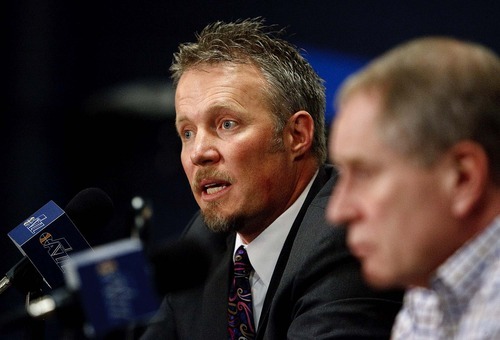This is an archived article that was published on sltrib.com in 2011, and information in the article may be outdated. It is provided only for personal research purposes and may not be reprinted.
I once asked Larry Miller who had more power in the Jazz organization, Jerry Sloan or Kevin O'Connor. He rubbed his forehead for a few seconds, the way he often did when ruminating and rummaging through about a hundred more considerations than the questioner ever imagined, not unlike an author stroking his beard on the verge of hatching a great novel, and then he said …
Hold on. Before we get to what he said, let's think about what the Jazz are now. They've changed, not just on the coach's bench, not just on the roster, but something more fundamental, more to the core. Some believe that basic change is for the worse, some for the better.
But what transpired on Wednesday, after what happened 13 days before, on top of Larry's passing two years ago this week, has signaled a less conservative, more aggressive mode for the Jazz. Whether that mode leads to real progression or simply a state of spinning wheels is a story yet without an ending.
On the day Sloan announced he was resigning as coach of the Jazz, Greg Miller reiterated what his mother, Gail, had forcefully said a year earlier: That the Jazz were all about trying to win a championship. Not sure if the emphasis was on the trying, or on the championship. But Gail essentially said, "You play to win the game."
Some are convinced that, outside of San Antonio, that's a virtual impossibility for a small-market team, especially with an NBA trend toward star players assembling themselves in bigger markets, where franchises offer greater off-the-court opportunities and have fewer concerns about expenditures.
Luxury taxes, to them, are a part of doing business. There was a time with the Jazz when what happened Wednesday — the trading of the team's best player — would never have happened. Miller said he had a "feeling" that the Jazz would be unable to keep Deron Williams when he became a free agent in a couple of seasons: "While I never saw any indication that he wouldn't re-sign with us," Miller said, "I never saw any indication he would."
So, on that basis, along with the fallout from the dustup between Sloan and Williams, and Sloan's subsequent resignation, one of the best point guards in the NBA was offloaded to New Jersey, and the Jazz were transformed.
Man, alive.
The stodgy, stubborn, slow-to-move Jazz, then, altered their entire makeup, in part, because of the owner's "gut sense" about what might or might not happen in the future.
Around here, that's not evolution.
It's revolution.
Larry may have bought the team on a feeling in his gut, but, ever since, nearly every potential move has been painstakingly analyzed, and usually never realized.
We're talking about a franchise whose historic definition of a big move was signing Milt Palacio as a free agent or acquiring Donyell Marshall by trade. The Jazz were so resistant to change, so stuck in their past, that they actually thought it was a good idea to bring back Greg Ostertag, after letting him go the first time.
O'Connor explained his reasoning about Wednesday's trade thusly: "It was a combination of looking at a deal that I thought was healthy for our franchise, and … running the risk of losing [Williams]."
The rudimentary change in the Jazz, at least in this case, is a manifestation of the allowance within the league's current Collective Bargaining Agreement for significant players to wander off at the end of their deals to supposed brighter horizons. That proclivity, seen in Phoenix and Cleveland and Toronto last offseason, featuring clubs that got nothing in return, might be addressed in the coming labor negotiations, by way of a franchise tag or harder salary cap.
But the other part of what O'Connor said was notable, too, the part about looking at a deal he thought was healthy for the Jazz — and then actually pulling the deal off.
The Jazz got Devin Harris, Derrick Favors, two first-round picks, including an unprotected pick from horrible New Jersey after this season, and cash. They gave up a ton of talent in Williams, and, typically, the team that engages in a trade and gets the best player in the deal winds up with the better end of it. Still, in this instance, the Jazz got something for something.
Considering Utah likely will not land many — any? — megastar free agents in the years ahead, loading up on high draft picks and younger players with potential, such as Favors, could be an enlightened way for the Jazz to do their business.
Certainly, it's a preemptive, aggressive way, something much different than the conservativeness we've seen in the past.
Miller was insistent on Wednesday that many of the Jazz's honorable traditions will remain the same.
But in a shocking fortnight during which they saw their iconic coach leave, his longtime assistant leave, and now, the biggest move of all, their best player traded away, almost anything involved with the club can be tossed in the air, in the blender, out the window.
Back to Larry's answer to the power question, and it could be the key to opening the floodgates to change, be it for better or worse, now that the man's gone.
Jerry Sloan. He said it was Jerry Sloan.
GORDON MONSON hosts "The Gordon Monson Show" weekdays from 2-6 p.m. on 104.7 FM/1280 AM The Zone. He can be reached at gmonson@sltrib.com.



